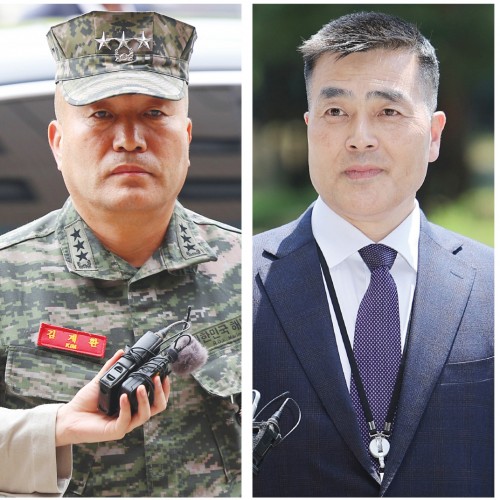 |
| Marine Corps Commandant Lt. Gen. Kim Kye-hwan (left) and former Marine Corps investigation team leader Col. Park Jung-hun, who are making conflicting claims over interference of President Yoon Suk-yeol on the military investigation into last year’s death of a young Marine named Chae Su-geun, appear at the Corruption Investigation Office for High-ranking Officials (CIO) in Gwacheon, south of Seoul, on May 21, respectively. / Source: Yonhap |
AsiaToday reporter Kim Myung-eun
With less than a month left for the 21st National Assembly’s term of four years, President Yoon Suk-yeol exercised his right of veto, injecting more uncertainty into political chaos.
Yoon on Tuesday vetoed an opposition-led bill seeking to initiate a special counsel investigation into a controversial military report regarding the death of Marine Corporal Chae Su-geun last year. The special investigation bill goes against the constitutional spirit, Chung Jin-suk, the presidential chief of staff, said during a press briefing.
This marked Yoon’s 10th veto of a bill since taking office in 2022.
Public fatigue has exceeded the limit under the Yoon administration as the main opposition Democratic Party (DP) railroading contentious bills taking advantage of its majority position and the president exercising his veto right has been repeated. Besides, there is a growing concern that the hate politics of antagonism and conflict will not be resolved throughout Yoon’s term as the structure of the main opposition party retaining a majority will maintain for the next National Assembly.
Regarding the veto, the DP announced its intention to reintroduce the bill through a revote during a plenary session scheduled for May 28, calling for impeachment of the president.
“The Yoon Suk-yeol regime has finally chosen the path to confront the people,” DP leader Lee Jae-myung said at the National Assembly. “Don’t forget the lessons of history,” he added.
The presidential office and the ruling People Power Party (PPP) accused the opposition’s attempt of an anti-constitutional tyranny that goes against the principle of separation of powers.
The right to veto a bill stipulated in the Constitution is a means for the president, who is the head of the executive branch, to check the legislature. This is why some point out that if the opposition party continues to attempt to neutralize the president’s authority stipulated in the Constitution, it could face huge backlash from the public.
“If the ruling and opposition parties reach an agreement, we can accept the special prosecution bill,” the presidential office said, leaving room for compromise.
#Yoon Suk-yeol #veto #Marine #special counsel investigation
Copyright by Asiatoday
Most Read
-
1
-
2
-
3
-
4
-
5
-
6
-
7





















